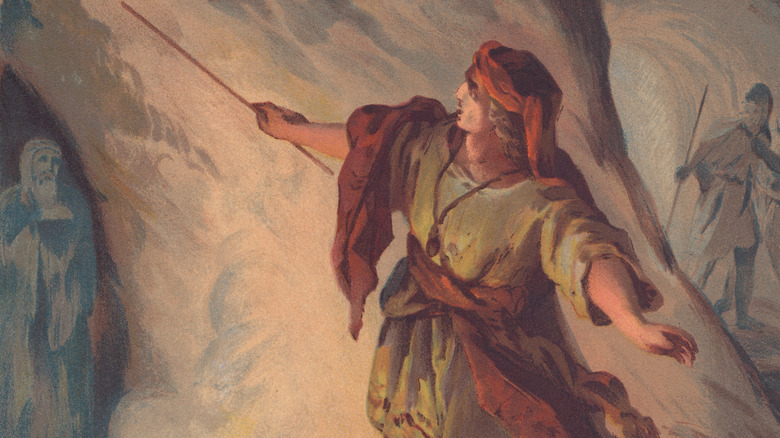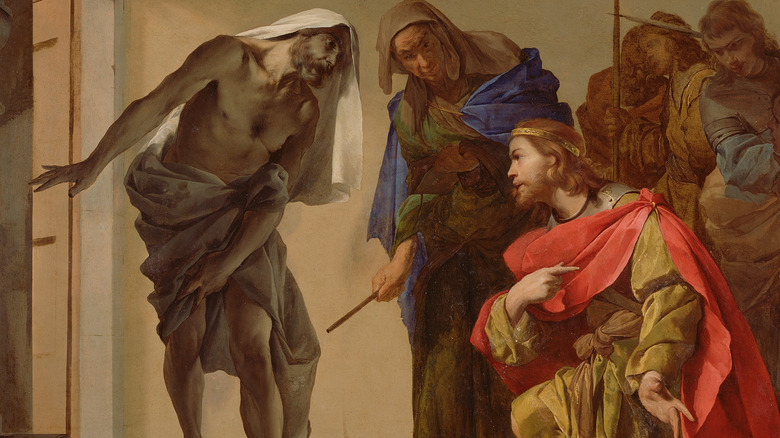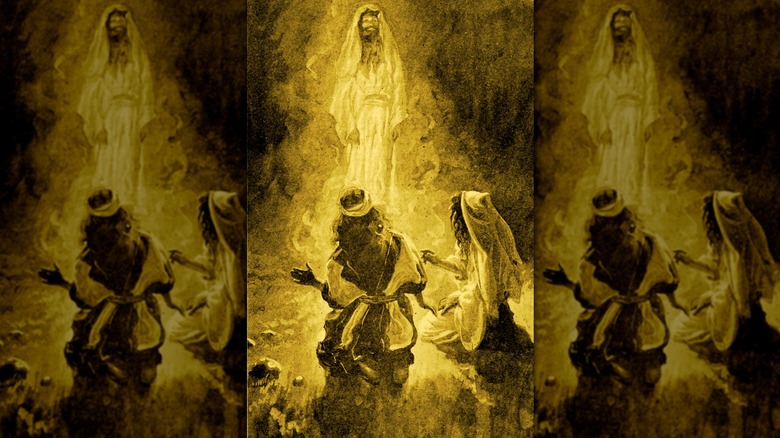Who Was The Witch Of Endor Mentioned In The Bible?
There is little sympathy for magic in the Bible. At the same time that God handed down the Ten Commandments to Moses at Mount Sinai, he decreed that the nation of Israel should not suffer any sorcerer to live (via Bible Gateway). That hostility is reiterated in Deuteronomy, where the Hebrews are warned against practicing any magical art, be it divination, spellcraft, or necromancy. Yet magic is found throughout the Bible. It is a tool of the enemies of heroes, a false power to be shown up, and the last desperate grasp of those abandoned by God.
Such was the desperation of Saul. He was the king of Israel, the country's first king, chosen by the prophet Samuel. But no sooner had Samuel set aside his own leadership did King Saul fall into disfavor with the Lord and the prophet. Twice in his lifetime Samuel rejected Saul, the first when the king usurped the authority of a priest by offering a sacrifice himself, the second when he hoarded the choicest flocks of the Amalekites instead of slaughtering them all. After the second infraction, the first book of Samuel says that the prophet "mourned" for Saul, but he utterly rejected him as a worthy king of Israel.
By the time Samuel died, he had anointed David as king, and Saul's kingdom faced ruin from the Philistines. His entreaties to God were met with silence, and he had banished magicians and mediums from Israel. But in his desperation for guidance, he sought out a woman known as the Witch of Endor and promised her immunity for her craft if she summoned the ghost of Samuel.
The witch of Endor facilitated the third rejection of Saul
The Witch of Endor's necromancy is described in 1 Samuel 28. Specifically, she was deceived into performing her magic after Saul came to her in disguise. When he asked for Samuel, and when the prophet's ghost appeared to her, the witch realized who her client was and grew furious with the king — but she still summoned the dead prophet for him.
The witch had the power to call Samuel from the dead, but she couldn't put him in a good mood about it. Samuel berated Saul (and Saul only) for disturbing him. And when Saul pleaded with him for advice, Samuel replied, "Why do you consult me, now that the Lord has departed from you and become your enemy?" He made it plain that God had decisively abandoned Saul and would deliver the kingdom of Israel unto David, but not before the Philistines destroyed Saul's army. "And tomorrow," Samuel told the man he had once raised to kingship, "you and your sons will be with me."
When Samuel's ghost departed, the Witch of Endor did not comfort Saul in his despair but did urge him to eat and gain strength. When his advisors concurred, Saul accepted her food before leaving and kept his promise — the witch was left unharmed. But every prediction that Samuel made through her came to pass. After his sons were slaughtered, Saul killed himself rather than face torture by the Philistines.
The witch of Endor was a popular subject for writers and artists
The Witch of Endor only briefly appears in the Bible — her act of necromancy fits into a single chapter of the first book of Samuel. But this episode of magic has attracted considerable interest over the millennia. Scholars and translators have wrestled with the biblical condemnation and church dismissal of magic alongside the appearance of Samuel's ghost, which is treated as genuine. The famous Greek translation of the Old Testament, the Septuagint, described the witch with a word close to "ventriloquist," and her shock at seeing Samuel's ghost may imply that she was a run-of-the-mill charlatan whose genuine necromancy for Saul was facilitated by God (via The Thoughtful Catholic). And according to the Associates for Biblical Research, archeologists have assumed a connection between the Witch of Endor and the pagan use of ghost pits, which were holes dug at sacred sites for necromancy.
But apart from any theological or historical questions, the Witch of Endor has been a popular subject in art, music, and literature. Henry Purcell's haunting "In Guilty Night" is built around the episode (per The Bible as Music). Several of these works greatly expand on the witch's magical abilities. Geoffrey Chaucer likened her to the oracles of Greece by describing her as a "Phitonissa" in "The Canterbury Tales," and Guillaume de Salluste's "La Semaine" suggests that her summoning of Samuel is accomplished through burning the fat of her own son (via per Britannica).


